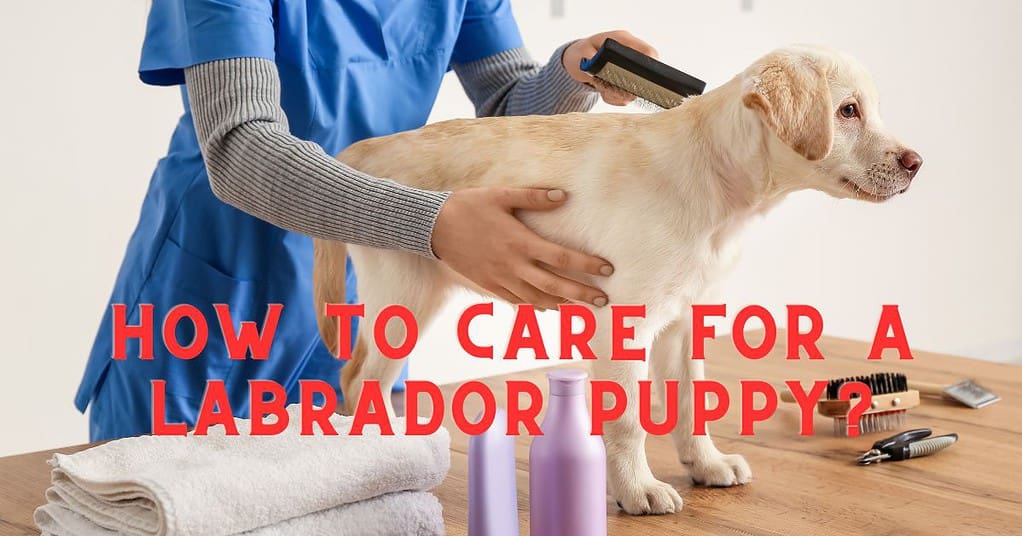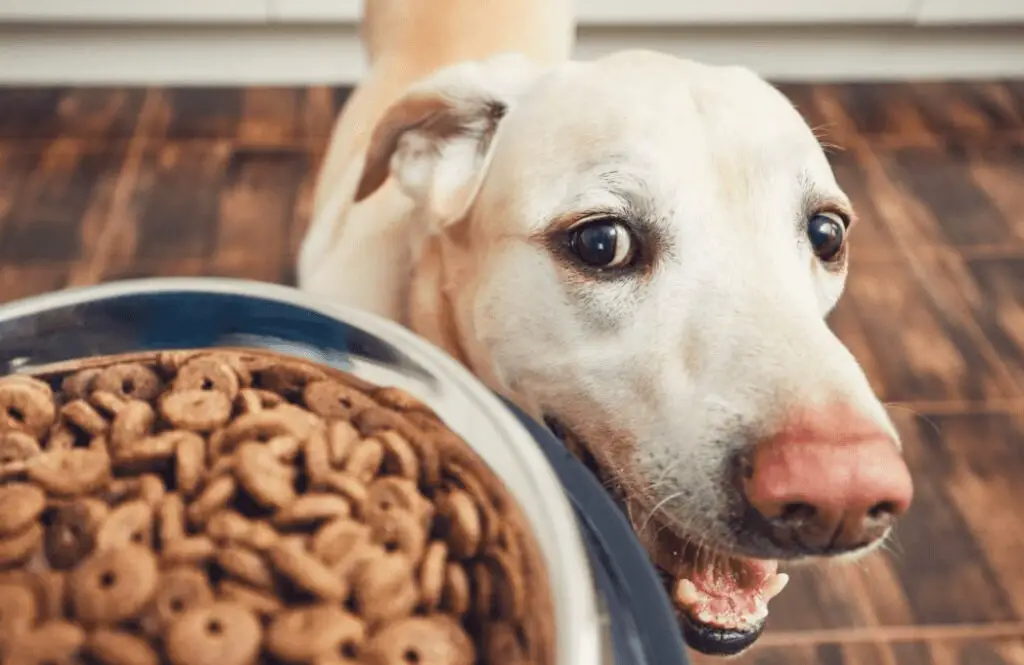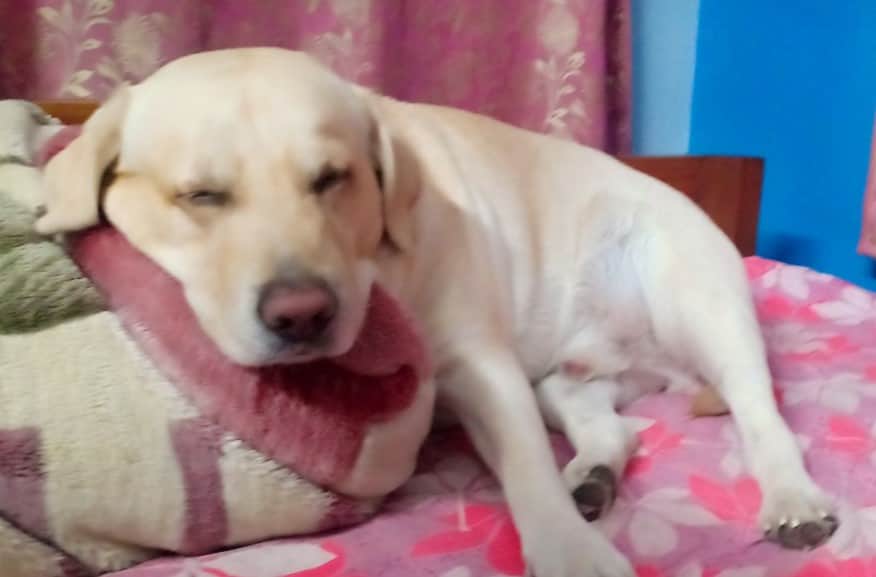Labrador puppies are one of the best dog breeds. Lab puppies at 8 weeks old are in their prime cuteness. These little bundles of energy are full of curiosity and playfulness, making them the perfect addition to any family.
But what should you expect from your new furry friend at this age? This article will provide a complete guide for lab puppies at 8 weeks, their behavior, training, and care. Let’s get started!

Feeding and Care Regimen for an 8-Week Labrador Puppy
Getting a new puppy can be exciting and overwhelming for novice puppy owners. In a new environment, it’s essential to establish a feeding and care regimen for your 8-week-old lab puppy. Let’s get started with some helpful tips to guide you.
how much should an 8 week old puppy eat?
Establishing a feeding routine is essential for your puppy’s growth and development into guide dog. Here are some tips for feeding your 8-week-old lab puppy:
- Feed your Labrador puppy 3-4 times daily with small portions of puppy food.
- Provide a balanced diet that meets your puppy’s nutritional needs.
- Avoid feeding table scraps, as it can lead to an upset stomach.
- Choose a quiet and comfortable place for your Labrador puppy to eat.
- Always provide fresh water with every meal.
Treats and Water
Giving your Labrador puppy treats as a reward for good behavior is highly effective. However, choosing them wisely is essential. Here are some tips:
- Choose healthy and age-appropriate treats for your new Labrador puppy.
- Avoid giving your Labrador puppy human food as treats.
- Make sure to provide fresh water in a clean bowl at all times.
Vet Care
Regular vet check-ups are essential for your puppy’s health and well-being. Here’s what you should know:
- Schedule a vet appointment within the first few days of bringing your Labrador puppy home.
- Follow your vet’s recommendations for vaccinations and preventive care.
- Keep your Labrador puppy up-to-date on flea and tick prevention.
Microchipping
Microchipping your Labrador puppy is essential for its safety and identification. Here’s what you need to know:
- Microchipping is a quick and painless procedure.
- The microchip contains your contact information, making it easier to find your Labrador puppy if they get lost.
- Register your puppy’s microchip with a national database.

Choosing Safe Toys
Toys are essential for your puppy’s mental and physical stimulation. Here’s what to look for:
- Choose age-appropriate toys that are safe for your Labrador puppy to play with.
- Steer clear of toys with small parts that could pose a choking hazard if swallowed.
- Rotate your puppy’s toys to keep them interested and engaged.
Rest and Sleep
Proper rest and sleep are essential for your puppy’s growth and development into guide dogs. Here’s what you need to know:
- Ensure your Labrador puppy has a comfortable and snug sleeping area.
- Establish a bedtime routine that includes a last potty break.
- Encourage your Labrador puppy to sleep soundly through the night.
House Training 8-Week Labrador Puppies
With this new addition comes the responsibility of house-training your dog. Training your Labrador puppy to behave well takes patience and consistency, but it can be done successfully.
Potty Training
Potty training is a crucial aspect of house training a young puppy. Follow these steps for effective potty training:
- Establish a routine for potty breaks, including after meals, naps, and playtime.
- Select a location for your Labrador puppy to relieve itself and consistently take them there.
- Use positive reinforcement, like treats or verbal praise, when your Labrador puppy successfully goes potty outside.
- During indoor accidents, clean thoroughly to avoid future mishaps in the same spot.

Crate Training
Crate training is a helpful tool for house training and providing a safe space for your dog. Follow these tips for successful crate training:
- Choose an appropriately sized crate for your dog, allowing enough room for them to stand up, turn around, and lie down.
- To acquaint your Labrador puppy with the crate, begin with brief periods and gradually lengthen their time inside it.
- Ensure your dog views the crate positively through positive reinforcement, such as treats or toys.
- Please refrain from using the crate for discipline or leaving your dog in it for long periods.
Handling
Proper handling is crucial for your puppy’s socialization and well-being. Follow these tips for gentle and effective handling:
- Start by gently handling your pup’s neck, paws, ears, and tail, gradually increasing the duration and intensity of handling.
- Use positive reinforcement, like treats or puppy kisses, when puppies allow handling without resistance.
- Gradually introduce your dog to grooming activities, like brushing and bathing, to get them used to being handled.
Socialization
Your puppy’s growth and future behavior rely on socialization, which is crucial for guide dogs. Follow these tips for successful socialization:
- Gradually and positively introduce your dog to other animals, family members, and environments.
- Use positive reinforcement, like treats or praise, when your dog interacts positively with positive experience.
- Boost your puppy’s confidence and prevent fear by exposing them to diverse sights, sounds, and smells.
Obedience Training for an 8-Week Yellow Labrador Retriever Puppy
Let us guide you through the basics of obedience training for an 8-week-old lab puppy.
Teach Basic Commands
Teaching your 8-week-old Labrador puppy basic commands is crucial for their safety and well-being. Here are some basic commands you can teach your 8-week-old puppy:
Sit: Teach puppies to sit by slowly holding a small treat above their head and moving it back towards its tail. Following the treat with their head, their bottom will naturally lower to the ground. Once they sit, reward them with the treat.
Stay: Ask your puppy to sit, hold your hand, and say, “Stay.” Take a step back, and if your 8-week-old puppy stays put, reward them with a treat.
Come: Put a long leash on puppies and let them wander a short distance away from you. Then, call their name and say, “Come.” When they come to you, reward them with a treat.
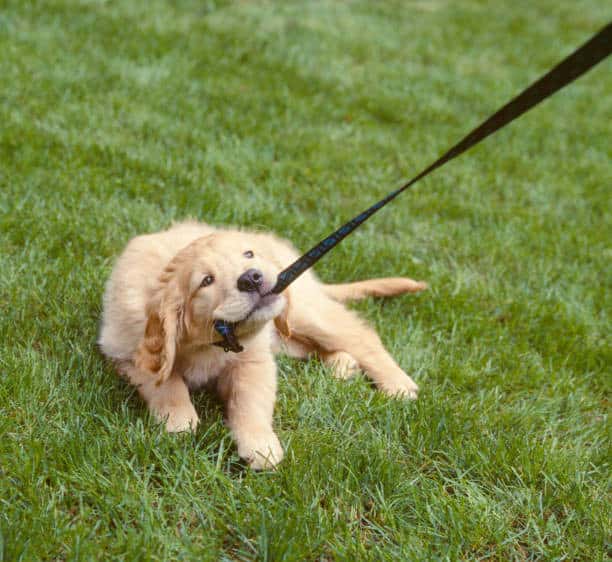
Establishing Boundaries and Limitations
Establishing boundaries and limitations is crucial in obedience training for your 8 week old Labrador puppy. It will teach them what is acceptable and what is not, preventing them from developing bad habits. Here are some ways to establish boundaries and limitations:
- Use consistent language and commands when teaching your 8 week old puppy.
- Set rules for where puppies are allowed to go in your home.
- Use baby gates or closed doors to restrict access to certain areas of your home.
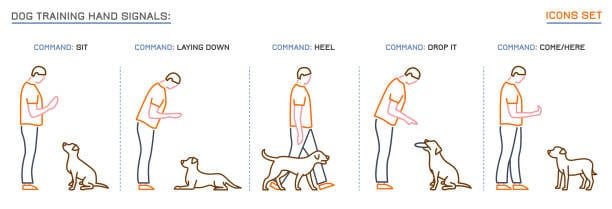
Preventing Unwanted Behaviors
Preventing unwanted behaviors is crucial in obedience training for your 8 week old Labrador puppy. It will prevent them from developing bad habits that can be challenging to break later on. Here are some ways to avoid unwanted behaviors:
- Supervise the puppies closely and correct unwanted behaviors like chewing or jumping.
- Offer them lots of toys and activities, like play biting, to keep your Labrador Retriever puppy from getting bored.
- Avoid giving your pup too much freedom too soon. Gradually increase its independence as it becomes more obedient and reliable.
Consistency and Patience
Consistency and patience are key in obedience training for your eight week old puppy. Training takes time and effort, but you can help your puppy become a well-behaved, obedient, and happy adult dog with consistency and patience. Here are some ways to be consistent and patient:
- Stick to a consistent training routine and use the same commands and language.
- Be patient with your puppy and avoid getting frustrated or angry.
- Don’t forget to celebrate and acknowledge small victories and progress as you train your puppy.
Leash Training
Leash training is essential to obedience training for your 8-week lab puppy. It will teach them how to walk calmly and obediently on a leash, prevent pulling, and ensure their safety while walking. Here are some ways to leash-train your puppy:
- Start with short walks with a dog walker in a low-distraction environment.
- Use a harness or collar that fits appropriately and is comfortable for your puppy.
- To promote good behavior, encourage your puppy to walk calmly by your side and praise and reward them with treats.
Common Puppy Behaviors and Solutions
Let us know about the common puppy behaviors and offer solutions to help you and your furry friend live harmoniously.
Biting and Destructive Behavior
Young puppies have a natural tendency to chew. If they don’t have suitable toys to play with, they may resort to destructive behavior, such as gnawing on shoes or furniture. To stop this bite inhibition, you can:
- Offer various toys to keep your new puppy engaged and entertained.
- Spray a pet-safe bitter spray on furniture and shoes
- Redirect their attention to toys whenever they start chewing on something they shouldn’t
Boisterous Behavior
New puppies can get overly excited and boisterous, leading to jumping, mouthing, and rough play. To train your new puppy to be calmer, you can:
- Ignore them when they’re overly excited.
- Teach “sit” and “stay” to your puppy to improve their behavior.
- Use positive reinforcement like treats to reward good behavior.
Running Off
New puppies have a lot of energy and may want to explore the world. It can be dangerous, as they may get lost or injured. To prevent this behavior, you can:
- Keeping your puppy in a fenced area or on a leash is essential when outside.
- Train them to come when called using treats and positive reinforcement
- Provide plenty of exercises and mental stimulation to satisfy their curiosity
Naughty Behavior
Older puppies sometimes exhibit naughty behavior, like barking excessively or begging for food. To correct this behavior, you can:
- Ignore attention-seeking behavior like barking or jumping
- Teach them a “quiet” command to stop excessive barking
- It’s best to avoid feeding your puppy table scraps or offering food from the table.
Sleeping Arrangements for an 8-Week Lab Puppy
Here are some helpful tips on creating the ideal sleeping arrangements for your furry friend:
Puppy Safe Sleeping Area
Puppy proofing is necessary to create a safe and comfortable sleeping area for your pup is crucial for their well-being. When creating a sleeping space, there are several factors to take into account:
- Choose a quiet, draft-free spot in your home where your puppy can rest without distractions.
- To keep your puppy safe, ensure their area is puppy proof, ie., free from dangerous objects or harmful items.
- Invest in a comfortable bed or mat for your pup to sleep on.
Crate Training
Most puppies subjected to crate training feel secure in their sleeping area. Here are some tips to crate train your puppy:
- Begin by selecting a crate with ample room for your pup to stand, turn, and rest easy.
- Make the crate cozy by placing a comfortable bed or blanket inside.
- Encourage your puppy to use the crate with treats and positive reinforcement daily.
Box Next to Bed
Consider setting up a box beside your bed to keep your Labrador Retriever puppy nearby at night. Here are some tips for creating a comfortable and safe space for your furry friend:
- Use a sturdy box big enough for your pup to move around in.
- Place a comfortable bed or blanket inside the box for your pup to sleep on.
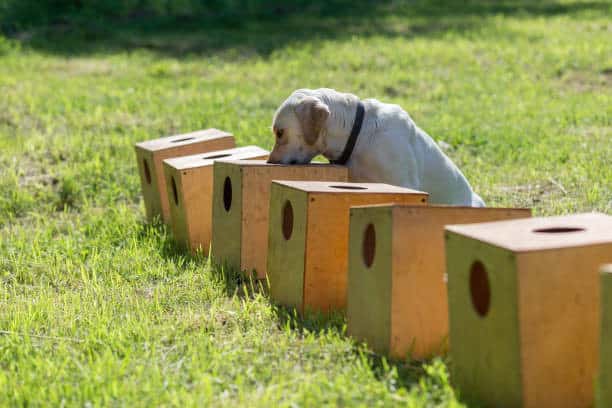
First Night with Your 8-Week Lab Puppy
If you’ve just welcomed a Labrador Retriever puppy into your home, it’s important to remember that this may be a new and unsettling experience for them. Being separated from their mother and littermates can cause anxiety and fear.Here are some helpful tips to follow to make your puppy’s first night with you as comfortable as possible.
Options for Sleeping Arrangements
Deciding where dogs will sleep is crucial for their comfort and peace of mind. Consider the following options:
Create a comfortable and secure sleeping space: Use a crate, a cozy bed, or a playpen to provide a designated sleeping area for your puppy. Make sure the area is away from drafts, noise, and distractions.
Sleeping with you: Some pet owners prefer to have their puppies sleep with them. Make sure that your puppy can’t fall off the bed and that there is enough space for both of you if you decide to have them sleep with you.
A room of their own: If you’re uncomfortable with your Labrador Retriever puppy sleeping with you, you can give them a separate room with a comfortable bed, toys, and water.

Sleeping and Crying
Your new puppy may cry or whine at night, especially in a new environment. Here are some tips to help them settle:
- Introduce them to their sleeping area: Show your puppy where they will sleep and give them time to explore the area before bedtime.
- Establish a routine: Many puppies thrive on routine, and having a consistent bedtime routine will help them settle. Consider taking them for a short walk, followed by some playtime, and then a calming activity such as reading a book.
- Calm and comfort them: If your puppy cries during the night, go to them, comfort them with soothing words, and reassure them that they’re safe. Avoid picking them up or making a fuss, as this can reinforce the behavior.
Expectations and Realities of an 8-Week Lab Puppy
To ensure you’re fully prepared for the responsibility, it’s vital to understand the expectations versus realities of owning an 8-week-old chocolate Labrador puppy before bringing one home.
Cuddles and Fun for Children
Expectation: Your children will have a new best friend to cuddle and play with, providing them with endless entertainment and joy.
Reality: While Labrador Retrievers are known for their friendly nature and love for children, an 8-week-old Labrador puppy can be a handful. Puppies require a lot of attention, training, and patience, and children need to understand the importance of gentle play and supervised interaction with their new furry friend.
- Teach your children to approach the puppy calmly and quietly.
- Supervise playtime to prevent roughhousing.
- Teach children never to pull the puppy’s tail or ears.
Success and Quick Results
Expectation: You will have a well-behaved, obedient puppy in no time, with minimal effort.
Reality: Training an 8 week old Labrador puppy takes time, patience, and consistency. Puppies are like babies and require regular attention. Start training to learn basic commands and appropriate behavior.
- Consistent dog training and positive reinforcement are critical, like in a large breed.
- Start with basic commands and gradually progress to more complex orders.
- Potty training can take few weeks, so be prepared for accidents.
Reality Check
Expectation: Your new puppy will be perfect and without any problems.
Reality: While Labs are known for their friendly and gentle nature, puppies can exhibit destructive behavior, such as chewing on furniture, shoes, and other household items. It’s essential to be prepared for the reality of owning a new puppy and the challenges that come with it.
- Give dogs chew toys to prevent destructive chewing of furniture or belongings.
- Crate training can help prevent destructive behavior when you’re not home.
- Consistency and patience are essential to a well-behaved and happy puppy.

Exercise and Playtime for an 8 Week Lab Puppy
Here are some tips for exercise and playtime for your 8 week old Labrador puppy.
Choosing Safe Play Areas
Before starting playtime or exercise, select a secure area free from hazards such as sharp objects or toxic substances. Consider the following guidelines:
Ensure the space is fenced or enclosed, especially if it’s outdoors. Avoid areas with high foot traffic, especially those with other humans or dogs, to minimize the risk of illness exposure.
Choose a clean and spacious area where your puppy can move freely without any restrictions. Remove objects, such as small toys or sharp objects, that can pose a choking hazard or cause injury.
Proper Exercise and Playtime
Provide ample exercise and playtime to ensure your Labrador puppy’s physical and mental well-being. Here are some tips for providing your Lab puppy with the right amount of exercise and playtime:
Start Slow –
An 8-week-old Labrador puppy is still young and growing, and their bones and joints are still developing. Commence with brief strolls around the neighborhood, gradually increasing the duration and vigor of the activity.
Playtime –
Playtime is essential for Lab puppies to burn off energy and stimulate their minds. Toys such as Kongs, ropes, and balls are great for playing fetch and tug-of-war. Incorporating puzzle toys is a fantastic technique to mentally challenge and engage your puppy.
Swimming –
Labradors love to swim, and it’s a great way to provide them with exercise and keep them cool on hot days. Supervise your puppy while swimming and introduce them to the water slowly.
Training –
Advanced training is essential to a Lab puppy’s exercise routine. Basic obedience training can be incorporated into playtime and mentally stimulate your puppy.
FAQs
How long do 8-week-old Lab puppies sleep?
They need 18-20 hours of sleep, with frequent naps, as they grow and develop into older dogs.
What should a 8-week-old puppy be doing?
They should be socializing, learning basic commands, and exploring their environment.
How much do 8 week puppies sleep?
They need around 18-20 hours of sleep daily, divided into short naps and extended nighttime periods.
How much should 8 week old Lab puppy eat?
The general rule is to feed 3-4 small meals daily, with 1.5-2 cups of high-quality puppy food. Most vets advise to gradually add more food as they grow.
Can I leave my 8 week old Labrador puppy home alone?
No, they need constant supervision and care at this age. If unavoidable, crate them for short periods with toys.
What is normal 8 week old puppy behavior?
They may exhibit playful biting, chewing, and exploring. They need training, socialization, and patience.
How long can I leave my 8 week old puppy in a crate?
Leaving an 8 week old Labrador puppy in a crate for more than two hours is not recommended. Gradually increase crate time as they grow.
How long can an 8 week puppy hold it?
An 8 week old Labrador puppy can typically hold their bladder for about two hours. Take them out frequently for potty breaks.
How much should I feed my 8 week old yellow Lab puppy?
Feed your 8 week old yellow Labrador Retriever puppy three to four small meals daily. There should be one to two cups of food during the meal time.
How long does it take to potty train a chocolate Lab puppy?
Potty training a chocolate Lab puppy can take several months. Consistency, patience, and positive reinforcement are key.
How much exercise does an 8 week old Lab puppy need?
An 8 week old Labrador puppy needs short, frequent playtime sessions and short walks on a flat surface. Avoid overexertion.
Author Profile

- Product Reviews Specialist and Cofounder
-
Labradors have an extraordinary capacity for love and companionship, and my mission is to help you unlock their full potential. Hi there! I'm Sarah, a proud contributor to Labradorandyou, the go-to online resource for all Labrador Retriever enthusiasts. As a lifelong owner and avid admirer of these remarkable dogs, I bring a wealth of knowledge and hands-on experience to our readers.
One of my strongest beliefs is in the power of positive reinforcement training. I'm truly passionate about helping our readers build strong, positive relationships with their Labradors. Whether you're a first-time owner or a seasoned Labrador enthusiast, I aim to provide you with the resources and guidance to cultivate a bond that will endure a lifetime.

